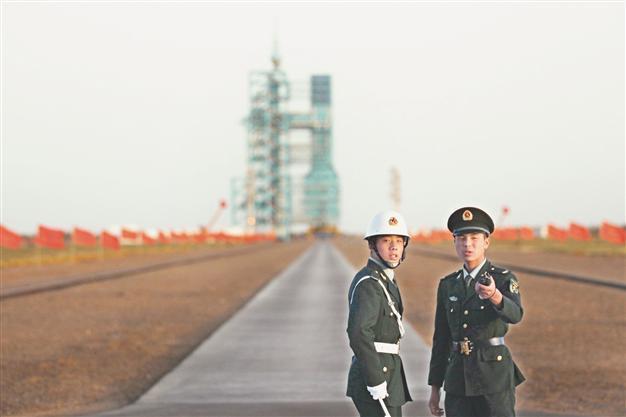Expanding space capabilities, Beijing draws Washington’s ire
WASHINGTON - Reuters

Soldiers stand in front of the Long March II-F rocket loaded with China’s unmanned space module. Washington is keeping a watchful eye on Chinese activities that could be used to disrupt US satellites. REUTERS photo
The United States is concerned about China’s expanding ability to disrupt the most sensitive U.S. military and intelligence satellites, as Beijing pursues its expanded ambitions in space, according to multiple sources in the U.S. government and outside space experts.
A classified U.S. intelligence assessment completed late last year analyzed China’s increasing activities in space and mapped out the growing vulnerability of U.S. satellites that provide secure military communications, warn about enemy missile launches and provide precise targeting coordinates, said the sources. “It was a very credible assessment that is now provoking a lot of activities in different quarters,” said one former government official who is familiar with U.S. national security satellite programs. The intelligence report raised red flags about Beijing’s ability to disrupt satellites in higher orbits, which could put the most sensitive U.S. spacecraft at risk, according to the sources. China has already conducted several anti-satellite tests at lower orbital levels in recent years.
Given the heightened concerns, Washington is keeping a watchful eye on Chinese activities that could be used to disrupt U.S. satellites. It is also urging Beijing to avoid a repeat of its January 2007 test that created an enormous amount of “space junk.” U.S. officials charge that China’s anti-satellite activities are part of a major military modernization that has seen Beijing test two new stealth fighters; step up cyber attacks on foreign computer networks; and launch more commercial and military satellites in 2012 than the U.S. China still lags behind the U.S. in most military fields.
Inevitable threat“What we’re seeing is a heightened sense in the U.S. that China is a potential threat and that it has the technology to be a threat if it wishes to,” said Jonathan McDowell, with the Harvard-Smithsonian Center for Astrophysics. “As China becomes a space superpower, and given that it does have a significant military component to its space program, it is inevitable that the U.S. will be concerned about threats to its most valued satellite systems, whether or not China intends to deploy such systems.”
On Jan. 11, 2007, China destroyed one of its own defunct weather satellites in low-earth orbit, which created over 10,000 pieces of debris that pose a threat to other spacecraft. A less-destructive test followed on Jan. 11, 2010. Space experts and officials say they expect China to continue testing anti-satellite technologies, although they doubt it would repeat the 2007 test, given the massive international outcry it triggered.
Gregory Kulacki, a respected researcher with the Union of Concerned Scientists, reported earlier this month that there was “a strong possibility” of a new anti-satellite test by China within the next few weeks. He said Chinese sources had told him in November that an announcement about an upcoming anti-satellite test had been circulated within the Chinese government, and a high-ranking U.S. defense official confirmed in December that Washington was “very concerned” about an imminent Chinese anti-satellite test.
Sources within the U.S. and outside said there was no immediate evidence pointing to the preparations for the type of satellite or rocket launches used by China for past anti-satellite tests at lower orbits. But they said Beijing could test its anti-satellite weapons in other ways that would be harder to detect, such as by jamming a satellite’s signals from the ground or issuing a powerful electromagnetic pulse from one satellite to disable another. Any further anti-satellite test by China would be troubling, especially if it occurred at higher altitudes, said Bruce MacDonald, a former White House official who is now a senior director at the U.S. Institute of Peace.
